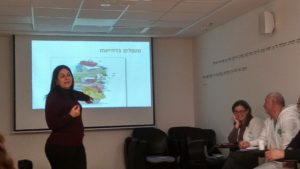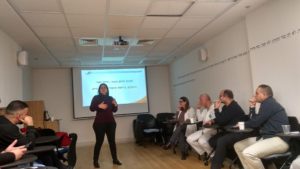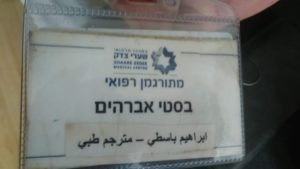We continue to hold Cultural Competence meetings for workers at Sha’are Zedek Medical Center. You can read more about our work with Sha’are Zedek here, here and here.
The hospital continues to provide professional enrichment to those who went through our medical interpretation course. These employees speak a range of languages, including Arabic, Russian, Amharic and French. This time, the enrichment covered preventive health and home safety. Our Aliza Shabo-Hayut, Director of our Living Safer, Living Longer project, gave the lecture.
Living Safer, Living Longer seeks to reduce one of the largest problems in preventive health and home safety – procrastination. We know it’s important to perform periodic examinations and tests for the early detection of different illnesses – periodic examinations by the family doctor, mammograms for women, tests for colon cancer, and more. But the daily hustle and bustle of work and family often get in the way, as do personal and cultural fears. This leads to missing opportunities for detecting serious illnesses early. As part of the presentation, Aliza and the participants shared personal stories of early detection, which saved lives – routine skin examination, detecting of a lump in the breast and more. We hope that the employees will use this information to promote their own health and that of their family members, and serve as ambassadors for preventive health and home safety.
Afterward, we held a practice exercise related to interpretation. The participants learned about the advantages of working on online documents (such as Google Docs), where a number of people can upload and update terms for translation at the same time, to the same document. The translation instructors will review the terms translated on the document so that an accurate, up-to-date and professional file of health-related terms – for children as well as adults – can be created.
We were also happy to see that the hospital felt that the interpreters’ visibility was important as well – new tags have been made for them to use when translating! This is how we advance professional medical interpreting, showing that medical interpreting is indeed an added skill, and not everyone can translate. Well done to the hospital management.
Many thanks to the Jerusalem Foundation for their continued support for Cultural Competence in Jerusalem for more than 10 years.




